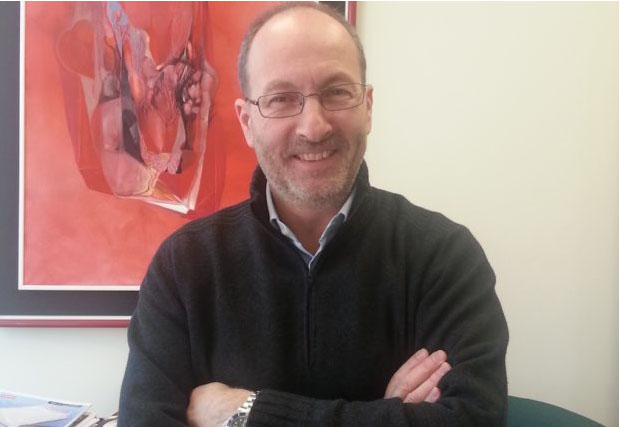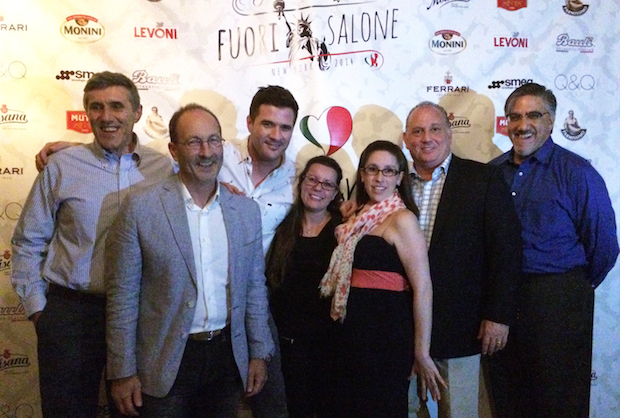Marco
Petrini: "I’ll Explain to You How Monini
Olive Oil Conquered the U.S.”
The president of Monini North America speaks to La
Voce di New York, about its success, but also about
the complexities tied to exporting Italian olive oil
to America.

Marco Petrini, presidente di Monini North America.
24 Apr 2018
From when it was established in 2000, Monini USA has
reached remarkable objectives, such as having expanded
distribution -- something no longer limited to the food
service industry. However, exporting Italian oil to
America also means confronting challenges and difficulties,
such as phenomena like "Italian sounding”
or adulteration. But for Marco Petrini, the key is to
aim towards quality and transparency. With perseverance.
A career that began with studying in the United States
at Boston College, then returning to Italy to oversee
family-run businesses. Marco Petrini – a Roman
by birth, but of an Umbrian family -- is from 2000 the
president of Monini North America, the historical Italian
business that produces oil, founded in Spoleto in 1920.
After 18 years on American soil, Monini has grown and
has conquered new market shares in the American market,
a very complex and often difficult to penetrate. Marco
Petrini speaks to La Voce di New York about the difficulties,
but also the results, tied to exporting Italian oil,
confronting phenomena like "Italian sounding”
and adulteration. "Aiming towards quality, informing
consumers, and being persistent”, are the order
of the day for Petrini.
How will Monini be in 20 years?
"A consolidated brand that has reached great results,
but that knows that it still can -- and must -- grow,
especially in the American market”.
From 2000, the year in which Monini USA was
established, you took on the role of President. Since
then, what have been the goals reached and the strategies
that have been adopted?
"Surely the most important ones have been that
of expanding distribution in major American cities,
that before was limited to the food service industry,
and today instead includes large retailers and specialty
stores. The strategies that we have adopted have mainly
been those tied to local initiatives, tastings. For
several years, we have also been affiliated with some
of the cooking shows hosted by Lidia Bastianich and
other talented American chefs. We are also promoting
and conducting oil tasting courses in culinary schools
to create awareness regarding the knowledge and the
use of Italian olive oil”.
What are the main complexities regarding the
American market?
"The complexities are tied most of all to culture.
When you say the United States of America, you’re
talking about 50 states, each different from the other,
and that have different food cultures from our Mediterranean
culture. If on the East Coast, especially in New York,
more knowledge and information exist -- even if often
a bit misled regarding Made in Italy – but there
are also areas which remain virtually untouched in the
country, like the West Coast, the South, the Midwest.
In these areas, which are more distant from the Mediterranean
food culture, we must work more to create awareness
and inform consumers on how to use olive oil and what
its benefits are”.
There are two aspects regarding olive oil that
are hindering commerce and information: "Italian
sounding” and adulteration. How are you confronting
these phenomena?
"With quality. The Monini company has never compromised
when it came to the aspect of quality. Our extra virgin
olive oil is a competitive product with regard to pricing,
but it will not fold on quality. The "Italian
sounding” phenomena must be tackled using information,
with tenacity and continuity, in a market such as the
American one, which often allows itself to be guided
solely by pricing if the product is unknown. I advise
consumers to be suspicious of extra virgin olive oils
sold at $5 a bottle because in that case you’re
dealing with oils that have been modified by blending
other oils in the product, therefore changing its color
and taste profile”.
In your opinion, have Italian and American
establishments done – and do – all that
is possible to hinder the "Italian sounding”
phenomenon?
"They have, and they are, doing more in these
past years if we consider the campaigns that have been
set forth by the Italian Trade Commission in the United
States, the journalistic probes, the FDA inspections
that do not allow – when performed - any adulterated
oils to pass through. We need to work with perseverance,
aiming at information, at quality. We as a company do
all that is possible to convey a product that is tied
to Italian tradition, to quality”.
The Monini company was established in 1920
by Zefferino Monini and today it continues its activities
with a new generation. What are the elements of continuity
compared to the past, and how does an historical company
such as this one continue to innovate itself?
"Certainly, the first 40 years of the
Monini company were dedicated to a regional presence,
quickly aiming at extra virgin olive oil right from
the beginning -- which is the most difficult product
to produce but also the healthiest. Starting from the
1970s, Monini oil spread at a national level and became,
in the extra virgin category, the market leader. At
the end of the 1990s, we opened up to the European markets
and finally, in 2000, we arrived in the United States.
The continuity is represented by the respect for tradition
and the raw material, but above all, by the quality
that has remained at the highest level. Today, Monini
allocates 35% of its production to exports: Europe is
at the head, with countries such as Poland, Russia,
Switzerland, but also the United States, Canada and
Asia. We are also growing well in China. In 2001, Monini
invested in Australia, in New South Wales, acquiring
700 hectares of land in which 300 are allocated for
cultivation. We have established a modern olive grove
with 110 thousand plants of Frantoio, Leccino, Pendolino
and Coratina, which were brought over as young plants
from Italy”.
In the United States, how is consumption of
your oil distributed geographically?
"The East Coast absorbs 30% of our United States
exports, with cities such as New York, Boston and Philadelphia
at the head. In North America, 60% of our production
is distributed to retail, while 40% to the food service
industry. Before, we were present almost exclusively
100% in the food service industry, which is the primary
lead industry if you want to begin breaking into foreign
markets. Today, other cities, such as Chicago, are in
net growth -- or even Los Angeles. In the future, we
are aiming at smaller markets, in more rural areas”.
What are the error that Italian companies
often make when they wish to enter the US market with
their products?
"Companies often arrive in the United States thinking
that it will be an easy win because the company is already
consolidated in Italy. Many arrive in America with an
Italian approach, but you have to remember that this
country has different rules, and above all, a different
culture. The most important thing is to remember that
the Untied States does not represent one market, but
different markets, from Florida to Portland, from the
East Coast to the West – they are all states,
areas, with different mentalities and cultures, where
you must convey the product with different messages
and strategies. I advise, if you want to be successful
in America, to survey the various geographical areas
-- explore them, get to know them, aim at continuity,
understand how the mentality works, and don’t
ever get discouraged”.
How does Monini defend the Made in Italy merchandise
mark and what will the brand look like in 20 years?
"Our brand has always been characterized by the
production of extra virgin olive oil, at 95%. Since
being present in the United States, we do not make an
ad hoc product for the American market. Our oil arrives
directly from Italy – we do not have a plant in
the United States, except for our business headquarters
that manages sales and inventory. The products that
are sold on the shelves in Italy, in Europe, are the
same products that arrive in the United States. Our
product is authentic, of quality. We do not compromise
on the quality to satisfy the pockets of American consumers
that want to spend less. In 20 years from now, I imagine
– and hope - Monini will be a consolidated brand
that has reached great results, but that can and must
still grow, especially in the American market”.

The Monini North America team.
What are the guidelines for the American consumer
that is not familiar with you and wishes to purchase
Italian olive oil?
"The American market is a complex one
where there are 4 times as many product choices in comparison
to what you find on supermarket shelves in Italy. Sometimes
you get confused in a supermarket when faced with so
many product choices of the same category. Unfortunately,
sometimes consumers make a choice based on the appearance
of the bottle, often portraying a beautiful image and
claim, and it is here that ‘Italian sounding’
is damaging. Only correct information – including
understanding the origin of the product ad authenticity
of the brand– can assist the consumer in choosing
a product based on its quality”.
What do you aim at to set yourselves apart
from your competitors?
"Quality and the history of the company always
remain strong, and today we’re aiming at the Italian
regional mono-cultivar, spanning a trend that is beginning
in the United States. Monini presents itself on the
American market with regional cultivars, such as the
Sicilian Nocellara del Belice, the Tuscan Frantoio,
and the Coratina from Puglia”.
You have a long carrier in the export and sales
industry. You studied at Boston College and the Monini
company chose you as president of its US company. In
what way have you made use of your experience and educational
background?
"My studies in marketing and human resources at
Boston College certainly allowed me to be trained in
America and to become familiar with its system from
a young age. After completing my college degree at Boston
College, I returned to Italy to work for family-run
businesses, and for a year I also worked for Johnson
& Johnson. I entered to become part of the Monini
company in 1993 as an Export Sales Manager, and in 2000
the company wanted me to oversee the American market
in the role of president of Monini USA. A great satisfaction
for me, having been part of the growth of this company
in such a key export market.""
|
